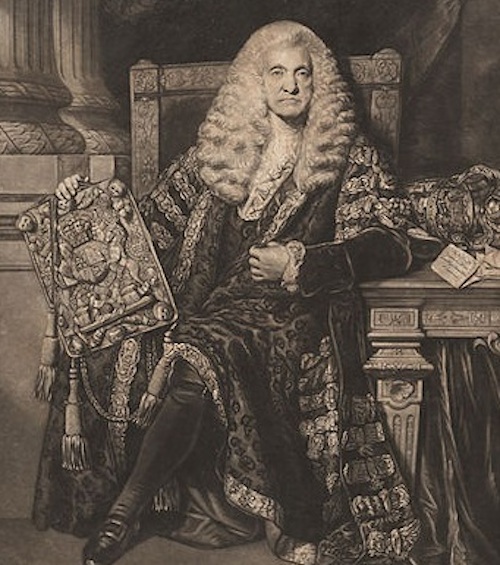Where else but Queensland? ... The monarchist puppy disguised as an attorney general ... QCs ... Why not do it properly and bring back serjeants-at-law, coifs and heraldic devices? ... Plus, the High Court leaves us ever more exposed to executive action, without a shield ... Procrustes on his high horse
 A Brisneyland Queen's Counsel
A Brisneyland Queen's Counsel
THE gender-wrangling, name-calling that passed for an election entrée in recent weeks added to your correspondent's winter discontent.
All seemed grey until a break appeared in the unremitting murk. TGFQ.
Yes, thank God, gods or your deeply felt atheism, but thank it, him, her, them or all of the above for Queensland.
Where else would a 31-year-old puppy disguised as an attorney general, armed with three years commercial law experience gleaned in the white hot legal purlieus of Maroochydore and the Sunshine Coast, come up with the return of the post-nominals "QC" to replace the hated republican letters "SC"?
But what of the poor souls who received the nod during a lapse in public attention that allowed the barbarians to control such vital matters?
Fortunately for them, Bleijie AG has thought this all through, and they have only to apply to be allowed into Lawyer Valhalla with the others of the Great and the Good.
Of the 74 in this unfortunate position, 70 have seen the light, and begged that they return to the future, rebadged as QC.
A little reflection though reveals the tawdry limitation of Bleijie's imagination.
Why a future populated only with the ghosts of past QC status?
Alexander Sullivan, the last serjeant-at-law, only died in 1959. Bring back the serjeants, says Procrustes, and with them, the rule that only serjeants may be appointed to the bench.
That'll soon sort out the sheep from the goats.
The possibilities for a fawning fop like Bleijie and his mates are boundless.
All seniors are to wear a coif (and there is plenty of room for a really arcane squabble over the correct colours for a coif).
As part of the monarchist lickspittling project, seniors should also be required to apply for a suitable heraldic device: beer tankards rampant with a meter maid couchant, bikini bottom gules on a field argent, crest a photo of the Queen of England laminate. (The lamination is to protect against the constant brown-nosing.)
The need for emblazoned heraldry leads to a Queensland Bar King of Arms to survey the proposed coats of arms, and he (women won't be invited to this Top Chaps position) will need a team of pursuivants-at-arms (messengers and enforcers).
The exhumation of the past and its clammy embrace of the present is a growth industry that can only enhance employment in these difficult times.
* * *
WHILE Queensland grapples with these momentous prospects, the High Court has been handing down some interesting judgments, one continuing the Queensland theme.
In Condon v Pompano Pty Ltd, decided in March on appeal out of the Sunshine State, the all Highest appear to be relaxed and comfortable with extending the jurisprudence on criminal intelligence.
It's four years since the French Court in K-Generation OK'd the handing-up of secret evidence in court, which a judge could then use against the affected party's interest.
Pompano takes what has become the usual rubric in State legislation a little further, so that now the exclusion of chummy and his lawyers from the court room is sanctioned, while the bench and the government discuss the use of the secret evidence against chummy.
The High Court seems to find none of this offensive to Chapter III standards of the basic requirements for a court.
This is the same court that has nine times in the last 20 years cited the US Supreme Court decision in Mistretta, most often quoting the injunction against allowing the executive arm to borrow the judiciary's reputation for impartiality and nonpartisanship.
Mistretta pointed out that the legitimacy of the judicial branch ultimately depended on that reputation, which was not to be borrowed by the political arms of government, "to cloak their work in the neutral colors (sic) of judicial action".
Well, what's wrong with running a closed court system?
The theory is the same as that espoused in the brand new UK Justice and Security Act 2013, which provides for courts to order affected parties out, on the application of the government. The sources of sensitive, secret materials before the court need to be protected.
The British statute overthrows the decision of the UK Supreme Court in Al-Rawi, only two years old, requiring open courts in which affected parties were present.
At least the Act deals with information coming from national security agencies, not with the unprovenanced "criminal intelligence" beloved by Australian State police.
 Gageler: stayed off the primrose path
Gageler: stayed off the primrose path
The High Court seems to have no understanding (with the exception of Gageler J in Pompano) that it is well down the primrose path.
For example, in the last month President Obama has mused publicly about the need for a court to be involved in the sanctioning of drone strikes i.e. the assassination of enemies of America.
The President will feel much relieved, emboldened and morally supported if he has a "court" announce (presumably after the event) that it sanctioned the killing, and perhaps even giving its reasons.
But what sort of a court will this be, where the luckless and shortly to die chummy will, needless to say, not be invited to put his case as to why he's not the evil towel-head that the CIA says he is.
 Baron Kerr of Tonaghmore: warns against untested evidence in closed court
Baron Kerr of Tonaghmore: warns against untested evidence in closed court
Here's what Lord Kerr had to say about one sided production of evidence in a closed court, as requested by the security services in (the now legislatively superseded) Al-Rawi:
"What, the defendants imply, could be fairer than an independent arbiter having access to all the evidence germane to the dispute between the parties? The central fallacy of the argument, however, lies in the unspoken assumption that, because the judge sees everything, he is bound to be in a better position to reach a fair result.
That assumption is misplaced. To be truly valuable, evidence must be capable of withstanding challenge. I go further. Evidence which has been insulated from challenge may positively mislead. It is precisely because of this that the right to know the case that one's opponent makes and to have the opportunity to challenge.
It occupies such a central place in the concept of a fair trial. However astute and assiduous the judge, the proposed procedure hands over to one party considerable control over the production of relevant material and the manner in which it is to be presented.
The peril that such a procedure presents to the fair trial of contentious litigation is both obvious and undeniable."
Monsters from Henry VIII to Stalin have insisted on having their lethal purges sanctioned by legal process.
History has later mocked the toy tribunals used for these occasions as no courts at all, but the present High Court seems bent on allowing the fairness that is at the core of what constitutes a court to be dissipated.
All seems predicated on our evergreen she'll be right, fair go Aussieness.
As our nine parliaments grind out ever more refined intrusions into our assumed rights, one wonders where we will look for comfort to check the sensation of abuse.
The present High Court is happy to abdicate its role in favour of the ballot box, an abdication that will leave many individuals as targets of executive action, and without a shield.